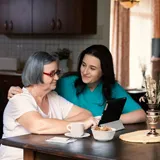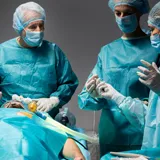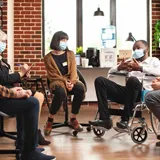Risk Factors
Colon cancer can affect anyone, but some people are more likely to develop it than others. Several factors, including age, lifestyle habits, medical conditions, and family history, can raise the chances of getting colon cancer. Understanding these risks can help with early detection and prevention.
Here are the main factors that may increase the risk of colon cancer:
- Although colon cancer can occur at any age, most people diagnosed with it are over the age of 50. In recent years, the number of younger individuals being diagnosed has increased, but the reason for this shift is still unknown.
- In the United States, Black individuals have a higher risk of developing colon cancer compared to people of other races.
- If someone has had colon cancer or certain types of polyps before, their chances of developing colon cancer again are higher.
- Chronic conditions that cause inflammation in the digestive tract, such as ulcerative colitis and Crohn’s disease, can increase the risk of colon cancer over time.
- Some people inherit genetic conditions that make them more likely to develop colon cancer. Two of the most common inherited syndromes are familial adenomatous polyposis and Lynch syndrome.
- Having a close relative, such as a parent or sibling, with colon cancer raises the risk. If more than one family member has had colon or rectal cancer, the risk goes up even more.
- Some research suggests that eating a diet low in fiber and high in fat and calories may be linked to a higher risk of colon cancer. Eating large amounts of red meat and processed meat may also play a role, though studies have shown mixed results.
- People who do not get regular exercise have a higher risk of colon cancer. Staying physically active may help lower that risk.
- Having diabetes or resistance to insulin, a condition that often comes with diabetes, has been linked to a higher chance of getting colon cancer.
- Being overweight or obese increases the risk of colon cancer. It can also raise the chances of dying from the disease.
- Long-term cigarette smoking may increase the risk of developing colon cancer.
- Drinking large amounts of alcohol regularly has been linked to an increased risk of colon cancer.
- People who have had radiation treatments to the abdomen for other cancers may have a higher chance of developing colon cancer later on.
Understanding these risk factors can help with prevention and early diagnosis. Making healthy lifestyle changes, staying up to date with screenings, and talking to a doctor about personal and family health history can all play a role in reducing risk.
Symptoms
Colon cancer can sometimes grow without causing any symptoms, especially in the early stages. That’s why regular screening is so important. When symptoms do show up, they can often be mistaken for signs of less serious problems. Still, any ongoing or unusual changes in your body should be taken seriously. Paying attention to these warning signs can help with early detection and better outcomes.
Here are some common symptoms of colon cancer to look out for:
- If you notice blood when you wipe, see it in the toilet bowl, or your stool appears dark or bright red, it’s time to talk to a healthcare provider. While the presence of blood does not always mean cancer, it could be from hemorrhoids, small tears, or even certain foods, it’s still important to get checked.
- If you experience ongoing constipation, diarrhea, or feel like your bowel movements aren’t empty, it may be a sign that something isn’t right. These changes, especially if they last more than a few days, should be discussed with a healthcare provider.
- Pain or discomfort in the belly that doesn’t go away or has no clear cause can sometimes be linked to colon cancer. Even though belly pain can have many causes, frequent or lasting discomfort should not be ignored.
- Feeling bloated is common and can happen for many reasons. But if the bloating lasts more than a week, gets worse, or comes with other symptoms such as vomiting or blood in your stool, it’s worth checking in with a healthcare provider.
- Losing weight without trying, especially if the weight loss is significant, can be a sign of a more serious condition like colon cancer.
- Throwing up from time to time might not be a cause for alarm, but vomiting without a known reason, especially if it happens often or is severe, needs medical attention.
- Feeling constantly tired or weak, or noticing that you’re short of breath during normal activities, may be due to several things. In some cases, it could be linked to internal bleeding or anemia, which are sometimes caused by colon cancer.
Even if these symptoms turn out to be from something less serious, it’s always best to talk with a healthcare provider when your body doesn’t feel right. Early diagnosis can make a big difference in treatment and recovery.
Causes
The exact cause of most colon cancers is still not known. While certain risk factors can increase the chances of getting colon cancer, doctors cannot always say why one person gets it and another does not.
Colon cancer begins when cells in the colon develop changes in their DNA. DNA is the instruction manual inside each cell that tells it how to grow, function, and die. When changes, also called mutations, occur in the DNA, they can make the cells grow out of control.
These abnormal cells start to multiply rapidly. Unlike healthy cells, which die off at the right time, these cells keep living. Over time, they can build up and form a lump called a tumor. This tumor can grow and damage surrounding healthy tissue.
In some cases, the cancer cells may break away from the tumor and travel to other parts of the body. This spread is called metastasis. Once cancer has spread, it can be harder to treat and may affect how well treatment works.
Diagnosis
Diagnosing colon cancer involves a series of tests and procedures that help doctors confirm if cancer is present, understand how far it may have spread, and decide on the best treatment plan. These tests also help rule out other conditions that might cause similar symptoms. Below are the most common methods used to detect colon cancer.
01
Colonoscopy To View The Colon
Colonoscopy is often the first step in diagnosing colon cancer. It uses a long, flexible tube with a camera on the end to look at the inside of the colon and rectum. The doctor can see the entire length of the colon and identify any abnormal areas, such as growths or polyps. During the procedure, tools can be passed through the tube to take tissue samples or remove polyps if needed.
02
Biopsy To Examine Tissue Samples
A biopsy involves removing a small piece of tissue so it can be tested in a laboratory. In most cases, this is done during a colonoscopy when the doctor finds something unusual. If the tissue can’t be reached during a colonoscopy, surgery might be needed to collect it. Lab tests can confirm if the tissue contains cancer cells and shows how fast the cancer might be growing. This information helps guide treatment decisions.
03
Blood Tests To Check Overall Health
Blood tests are not used to confirm colon cancer, but they provide useful information about a person’s general health. These tests can check how well the liver and kidneys are working, and they might show if someone has anemia, which could be a sign of bleeding inside the colon.
04
CEA Test To Monitor Cancer Activity
Some colon cancers produce a substance called a carcinoembryonic antigen, or CEA. A blood test can measure the amount of CEA in the body. High levels might suggest the presence of cancer. Doctors may use this test during and after treatment to see if the cancer is responding or if it has returned.
















